

Quaker Thought & History. Edward Grubb, 1925. Philadelphia Yearly Meeting of The Religious Society Of Friends. Quakers all share common roots in a Christian movement that arose in England in the middle of the 17th Century. Quakerism is at once a persona lfaith and a shared faith in that we seek for and respect the Divine spark (the "inner light" ) that is within each person and at the same time participate in that search as a community of seekers. Today, it is generally true that Friends adhere to certain essential principles: a belief in the possibility of direct, unmediated communion with the Divine (historically expressed by George Fox in the statement, "Christ is come to teach his people himself"); Faith & Play! BYM Religious Education. Welcome to the web site of the BYM (Baltimore Yearly Meeting) Religious Education Committee.
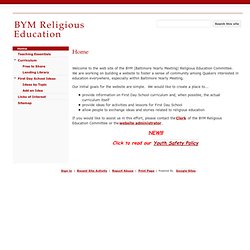
We are working on building a website to foster a sense of community among Quakers interested in education everywhere, especially within Baltimore Yearly Meeting. Our initial goals for the website are simple. We would like to create a place to... provide information on First Day School curriculum and, when possible, the actual curriculum itselfprovide ideas for activities and lessons for First Day Schoolallow people to exchange ideas and stories related to religious education If you would like to assist us in this effort, please contact theClerk of the BYM Religious Education Committee or thewebsite administrator. Click to read our Youth Safety Policy. Seekng the Spirit. First and foremost, Friends believe that there is that of God, or the Divine, or Truth, in each and every person.
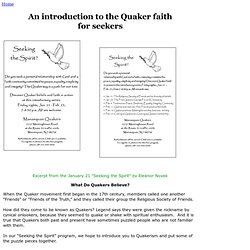
Of almost equal significance is the expectation that the Divine can lead and guide us in our daily lives. Most all of our testimonies, faith and practice stem from these core experiences. Because Friends rely on continuing revelation, they don’t simply adopt the creeds of past generations. Instead, Quakers testify to the truths discerned through their own individual and collective experience of God's leading. So a testimony is not a belief; it is committed action arising out of Friends’ religious experience. 1. Ursula Franklin wrote that “everyone is equal in the sight of God . . . everybody has the capacity to be the vessel of God’s word. Where Quakers are mentioned in social histories of the United States, it is often in association with reform movements based on equality: abolition of slavery, women's rights, Indian affairs, prison reform, civil rights.
Third Haven Friends Meeting: Essentials of Our Quaker Faith and Practice. Essentials of Our Quaker Faith and Practice: 2.10.2011 Prepared by Worship & Ministry committee.
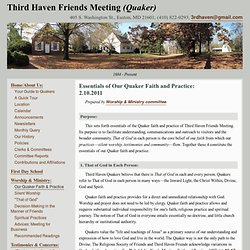
Purpose: This sets forth essentials of the Quaker faith and practice of Third Haven Friends Meeting. Its purpose is to facilitate understanding, communications and outreach to visitors and the broader community. That of God in each person is the core belief of our faith from which our practices—silent worship, testimonies and community—flow. Philadelphia Yearly Meeting - Library. Avery, Chel.
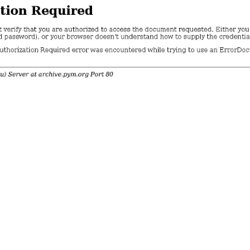
PEACE AND TAXES ... GOD AND COUNTRY: A GUIDE FOR SEEKING CLEARNESS ON WAR TAX CONCERNS. The War Tax Concerns Support Committee, PYM, 1990. 28p. Urges Friends to utilize traditional Quaker clearness committee as one way of helping members discover their own course of action. Crauder, Renee. Dougherty, Rose Mary. FROM THE CENTER OUT: A CURRICULUM ON CENTERING AND LISTENING FOR THE CALL (for kindergarten to 8th grade) Philadelphia Yearly Meeting Religious Education Committee, 1999. PYM Faith and Practice 2001.
Inner light. Liberal Quakers take this idea of walking in Christ's light to refer to God's presence within a person, and to a direct and personal experience of God, although this varies to some extent between Quakers in different yearly meetings.
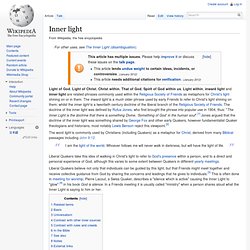
Liberal Quakers believe not only that individuals can be guided by this light, but that Friends might meet together and receive collective guidance from God by sharing the concerns and leadings that he gives to individuals.[3] This is often done in meeting for worship; Pierre Lacout, a Swiss Quaker, describes a "silence which is active" causing the Inner Light to "glow".[4] in his book God is silence.
In a Friends meeting it is usually called "ministry" when a person shares aloud what the Inner Light is saying to him or her. Related terms[edit] Related terms for Inner Light include Light of God, Light of Christ, Christ within, That of God, Spirit of God within us, and Light within.